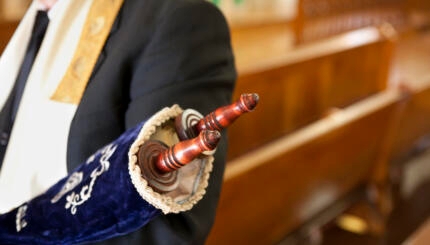Interfaith marriage is in the Jewish news again — just like it was in 500 BCE, as Jews returned from exile in Babylonia. During this time of cultural transition (c. 538-424 BCE), all Jewish leaders recognized the issue. Five biblical books record five different views.
Mordecai, royal courtier in the Persian capital Susa, and hero of the book of Esther, supported intermarriage. Intermarriage, he believed, could help affluent Jews rise in the royal court. Intimate relationships created in interfaith families could protect Jews against lies and conspiracy theories. In Mordecai’s lifetime, the ambitious courtier Haman alleged that Jews broke the King’s laws, and proposed to protect the King by exterminating the imaginary threat. But the King’s Jewish wife Esther intervened.
READ: Intermarriage and the American Jewish Community
Ezra and Nehemiah heroes of their own books, opposed intermarriage. Together, they led a group of nobles returning from exile to settle in Judaea. In Persia, many affluent, educated Jewish men had married Persian women. Perhaps these men shared Mordecai’s political philosophy. Perhaps it was too challenging for them to find compatible mates within their small Jewish community. Their intercultural, possibly interfaith, families faced a new reality in Judea. Here they were trying to actualize a dream of a Golden Age: a city of God, structured around their ethnic religion, a pure oasis for Jews in a turbulent region. When non-Jews offered to help rebuild, Ezra and Nehemiah refused, entrusting the work to Jewish hands only.
Several loyal and adventurous Persian wives had accompanied their husbands to Judea. They made a loving and idealistic decision. But the rough land held little future for their children. As teens, they would likely be sent to relatives Persia for education and socialization. They might never be equipped to join Judea’s ideologically fierce group of pioneers. Thus, it might be best to send them and their mothers home immediately. Relying anachronistically on Torah’s prohibition against Israelite-Canaanite marriage, Ezra and Nehemiah urged the returning men to divorce their foreign wives.
These two pragmatic positions introduce the post-exilic debate. But other voices, more ethical and spiritual, weighed in as well. Speaking to the returning settlers, the prophet Malachi urged, “Men, do not divorce the wives of your youth!” Your wife committed to you, birthed and raised your children, traveled with you to an unknown land, and committed to the Jewish project. And now, out of some newfound religious fervour, you would toss her and her children aside? If you were ethical, and respectful of her Jewish observance, you would not!
Envisioning the new Jerusalem, the prophet Zechariah insisted it would not be organized around religious and ethnic divisions. Instead, it would be a city without walls, reflecting a God without divisions. With the Temple reestablished, and God’s presence dwelling in the city, priests of all nations would worship there. Purity laws would no longer separate the holy from the unholy. Even horses would wear banners — just like the High Priest — with the words “Holy to the Lord.” On that day, Zechariah said, “God will be One and God’s name will be One.”
Is interfaith marriage socially and politically helpful to Jewish survival? Does it threaten ethnic and religious integrity? Is it an expression of love and respect? A recognition that all spiritual paths lead to God? All of these views have long been part of Jewish discourse. The task is to discern what is best for our time and place.



